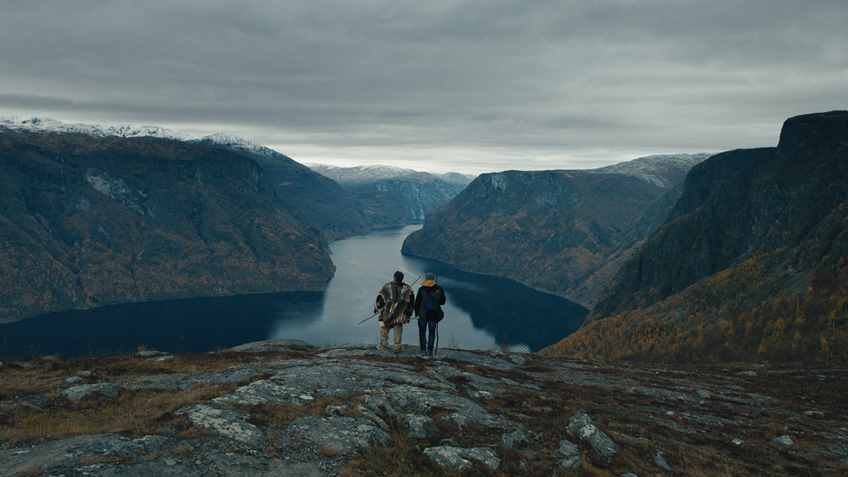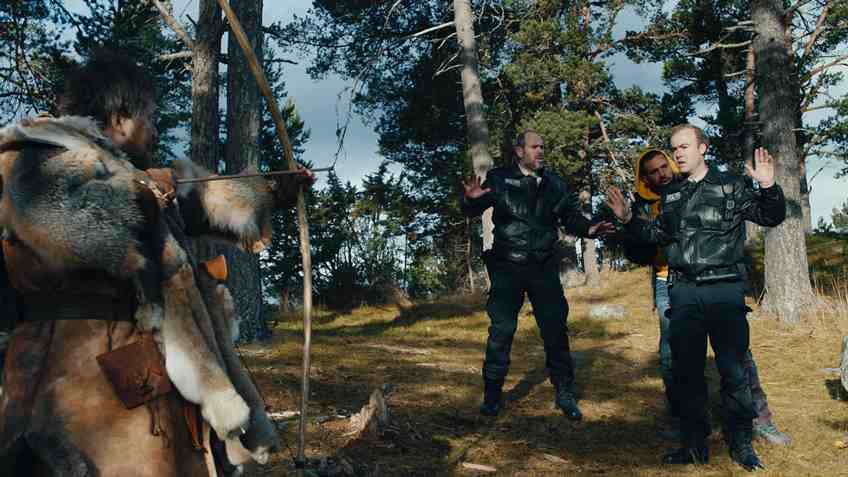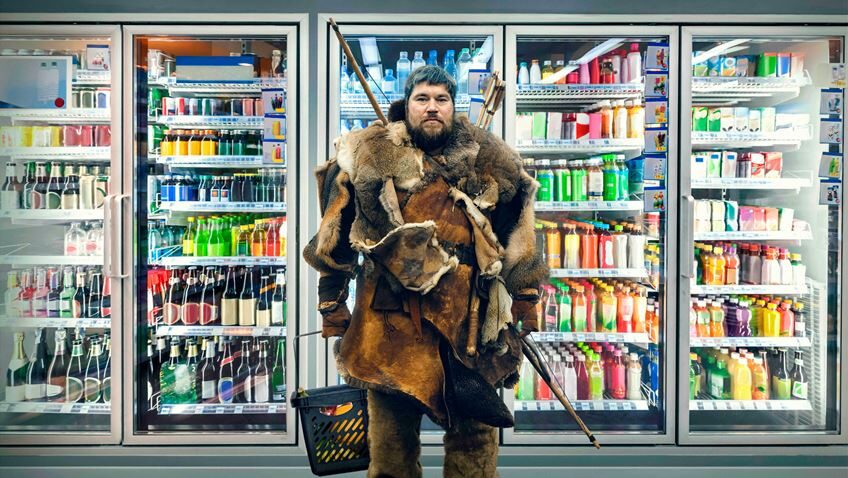Joyce Glaser reviews Wild Men (May 6, 2022) Cert 15, 102 mins.
Recently, The Times newspaper reported that former advertising executive Harry Wallop gave up his six figure salary and cushy urban lifestyle to live off grid in a makeshift cabin in Dorset. He took this decision when his deteriorating mental health made it hard for him to cope with the normal office routine. A similar lifestyle change, though more radical and considerably more bizarre is the starting point of Thomas Daneskov’s entertaining Danish black comedy Wild Men. A droll romp with a serious message behind it, the film is reminiscent of Morten Tyldum’s superb Norwegian comic-thriller Headhunters, if lacking that film’s suspense and refinement.
We find ourselves in medias res when a burly, bearded man dressed in animal skins and armed with a bow and arrow, robs a convenience store at a petrol station somewhere in Norway after assaulting the owner. Earlier, we had witnessed him missing his target in the wild and perhaps as a result, sobbing.
The man is Martin (Rasmus Bjerg), singled out for his Danish accent, who, later in the film, we learn was happily married to Anne (Sofie Gråbøl) proud of his two pretty daughters and fine house.
Though the wannabe Viking seems oblivious, he is a wanted man: wanted by his family, who drive from Denmark to find him and by the inept local police whose manhunt is compromised by one officer who, unlike Martin, wants to go home to his wife and homecooked dinner.

There are two parallel stories that run alongside and intersect with Martin’s. The first concerns a trio of cannabis smugglers who are heading for the ferry to Europe when their car hits a moose and crashes. Musa (Zaki Youssef), singled out for this ethnicity, has a gaping wound on his thigh, but is in better shape than his two partners in crime who are covered in blood and do not react when he tries to wake them.
With the police bound to find them, he hobbles off with a bag of cash when Martin finds him lying in pain in the woods. Martin offers to take Musa to the hospital. When Musa refuses, Martin stiches up his wound in a scene that is not for the faint hearted.
The police find the crashed car, only the two smugglers have survived and are looking for Musa in a motel near the ferry port. Musa and Martin are now being chased by the two criminals and the police. Though they are chalk and cheese, the two wanted men forge a bond in adversity. They head for a modern day Viking camp where Martin hopes to find kindred souls but finds only hypocrisy and disillusionment.
The second parallel story introduces detective inspector, Oyvind (the wonderful Bjorn Sundquist) whose character fits into the Nordic Noir tradition that we see on television. Oyvind, though a bit older, is the typically talented and dedicated, but morose and world weary detective, worn down by the system and by his failed personal life.
As Oyvind deals patiently with his two assistants, he misses his late wife, and may feel guilty that he did not have time to spend with her during her illness. There is a touching scene in which Oyvind meets Anne and seems determined to reunite her foolish husband with the loving, strong woman and mother he is taking for granted.
With the exception of Oyvind, Daneskov avoids the lugubriousness of the Scandi Noir on the one hand, and the quirky, deadpan, mannered style of great director, Finland’s Aki Olavi Kaurismäki on the other, to arrive at a style of his own. The result is an uneven tone – the film is short of laughs in this absurdist pursuit – and it is difficult to get a handle on Martin, or, until the end, sympathise with him.

Does he rob the service station shop because Vikings do not trade in money and he is staying in character, because he feels entitled to free food, or because he has lost it, and settles scores with violence? A similar situation occurs at the Viking camp where Martin charms a woman serving food, until she asks for payment, at which point he turns hostile.
It could be that Martin believes that those living in the wild like him ought to share, and he does lead by example, sharing food with Musa and the little medical care he can give him. He is also ready to help Musa escape his partners-in-crime and the police, ignoring the cash in Musa’s bag that does not interest him.
And you do not have to be Freud to suspect that Martin is compensating – with his macho, Conan the Barbarian outfit and self-sufficient, rugged lifestyle – for a feeling of emasculation in his bourgeois life in Demark.
Several scenes stand out. In addition to Oyvind’s conversation with Anne, two bereaved souls, and the encounter of Musa and Martin, there is a devastating scene where Anne finds her husband, dressed in animal skins and camouflaged to avoid being found by the search party. A few scenes miss the mark, including a subplot with a rabbit and Oyvind’s final stand.
Daneskov keeps his three strands moving and cleverly intersecting until the nicely ambiguous ending. Wild Men is not on a par with Headhunters (Norwegian), Woman at War (Icelandic-Ukrainian) or Jar Cit (Icelandic), but, for a fresh variation on the theme of male midlife crisis, it affords a satisfying blend of wacky adventure saga and buddy movie from a writer-director with a flair for believable relationships.




